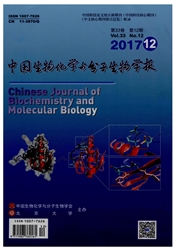

 中文摘要:
中文摘要:
微小RNA(microRNA)在肿瘤的发生发展中发挥重要作用。有研究表明,在结肠癌患者肿瘤组织中,miR-31表达水平增高。然而,定量PCR只能检测所在组织miR-31的整体表达水平,而无法观察miR-31在特定组织与特定细胞中的表达分布。目前,尚未见关于miR-31在结肠癌中原位表达的报道。本文从研究miR-31在结肠癌中的原位表达入手,进一步探究miR-31在结肠癌细胞中的功能及作用机制。原位杂交实验结果显示,miR-31在结肠癌肿瘤细胞中的原位表达明显升高;体外过表达或敲减miR-31证实,其可以促进结肠癌细胞增殖和集落形成;荧光定量PCR与Western印迹和双荧光素酶报告基因实验证实,在结肠癌细胞中,NF-κB通路的抑制因子丝氨酸/苏氨酸激酶40(STK40)是miR-31下游靶基因,miR-31靶向作用于STK40而激活NF-κB通路;反之,抑制NF-κB通路,miR-31的促增殖能力明显下降。上述结果提示,miR-31可能通过激活NF-κB信号通路而促进结肠癌的细胞增殖。
 英文摘要:
英文摘要:
microRNAs plays an important role in the pathogenesis of cancers. It has been shown by qRTPCR testing that miR-31 is highly expressed in colorectal cancers of patients. However,qRT-PCR can detect the expression only in the whole cancer samples but not in the local expression of miR-31 in cancer tissues. So far,the in situ expression of miR-31 in colorectal cancer has not been identified yet. The aim of this study was to investigate the in situ expression of miR-31 in colorectal cancer,and to further explore the role of miR-31 in vitro. The results showed that in situ expression of miR-31 in colorectal cancer cells was significantly increased by in situ hybridization method. miR-31 expression was detected using in situ hybridization in colorectal cancer tissues. The role of miR-31 was analyzed in colorectal cancer cells using cell proliferation assay and colony formation assay. The underlying mechanisms were further explored. The results showed that in situ expression of miR-31 in colorectal cancer cells wassignificantly increased,and the majority of miR-31 was located in colorectal cancer cells. Functional assays confirmed that miR-31 could promote the proliferation and clonogenic ability of colorectal cancer cells by transfecting the mimics and/or inhibitors of miR-31 in vitro. Serine/threonine kinase 40( STK40) was identified as the target of miR-31 in colorectal cancer cells by qRT-PCR,Western blotting and luciferase assay. miR-31 could activate NF-κB signaling pathway by targeting STK40. Upon inhibition of NF-κB signal pathway,the proliferative ability of miR-31 was dramatically decreased. In conclusion,the activation of NF-κB signaling pathway might be partially account for the mechanisms of miR-31 in promoting proliferation in colorectal cancer cells.
 同期刊论文项目
同期刊论文项目
 同项目期刊论文
同项目期刊论文
 期刊信息
期刊信息
